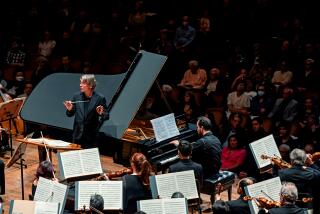MUSIC REVIEWS : PIANIST LOUIS LORTIE IN LOCAL DEBUT
It is easy enough to say that fine pianists are a dime a dozen. Then along comes a Louis Lortie, the like of whom does not appear every day, every year, or even every decade.
The 27-year-old, Montreal-born pianist, gold medal winner of the 1984 Busoni Competition in Bolzano, Italy, played for the first time here, in Ambassador Auditorium Sunday night, and by the end of the evening the audience was standing and cheering.
By any measure, Lortie is an extraordinary pianist. Even in the age of Horowitz, he sports a breathtaking technique. But it is the kind of mastery that is more than conventional technique.
He can play as fast, as loud and as excitingly as anyone, but the major impression is always a musical one. An incessantly active imagination constantly outpaces his fingers; he deals not so much in orchestral manipulation of the piano tone, as he does in minute varieties of the normal piano sound. In that sound, mellow and warm at its fastest and loudest, there is never a hint of harshness. Lortie is mainly a poet as much as a virtuoso, and he manifests the rare quality of commanding an audience’s silent and undivided attention.
His Mozart--the Sonata in B-flat, K. 333--was expectedly fluent, polished yet totally unaffected. He caused it to speak by maintaining a seamless continuity; all the little graces were present but the expressive force was in the logic and naturalness.
His unerring fingers and ever-alert sensitivity produced a Chopin B-minor Scherzo of dramatic impact, and an E-major Scherzo broad in scale yet mercurial in detail.
All this was enough to establish Lortie definitely, but it was his unflagging Liszt that amazed with the impeccable balance between poetry and fury.
Three “Etudes de Concert” shimmered in a kind of lyrical mist. Four of the “Transcendental” Etudes exhibited thistledown lightness in “Feux Follets,” compelling rhythms in “Wilde Jagd,” orchestral sonorities in “Harmonies du Soir” and a roaring blizzard in “Chasse-neige.” The encores were two more of the “Transcendental” Etudes, Nos. 3 and 4, called, respectively, “Paysage” and “Mazeppa.”
More to Read
The biggest entertainment stories
Get our big stories about Hollywood, film, television, music, arts, culture and more right in your inbox as soon as they publish.
You may occasionally receive promotional content from the Los Angeles Times.










